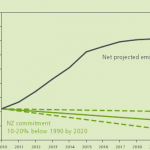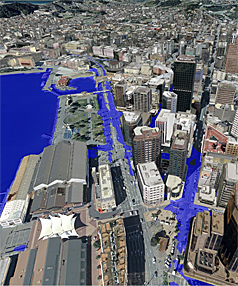
Is Tim Groser a Kyoto pariah? Or a Kyoto visonary? A global emissions reduction emissary or is he tar-sanded with a Canadian brush? I try to make sense of New Zealand’s double dealing and special pleading over the Kyoto Protocol second commitment period and the Doha climate change talks hooha.
I am very confused about New Zealand’s climate change policy since the Doha international climate change talks (COP18) and New Zealand’s announcement that it would opt out of a second period of the Kyoto Protocol back on 9 November 2012.
The Kyoto opt-out has been described as a shambles and a disgrace and as a lose-lose decision that shuts New Zealand out of the international carbon markets. Tim Groser’s Herald Op Ed today just confuses me more.
So I have a question for all Hot Topic readers.
If Minister of Climate Change Tim Groser is serious about New Zealand’s 2020 greenhouse gas target, why would he forego formally lodging the 2020 target into the existing Kyoto Protocol framework (where the national institutions and arrangements are already up and running), in favour of pledging to meet the target on a voluntary basis in terms of a yet to be negotiated treaty?
Continue reading “New Zealand’s double dealing and special pleading over Kyoto 2: part the first”

 It’s summer down south, and New Zealand’s politicians have embarked on their summer break. It’s summer in Waipara too, and with yesterday topping 30ºC and today heading in the same direction, your blogger has immediate climate concerns of an irrigation and vine management nature to attend to. So, with apologies for what may turn out to be less frequent posting over the next few weeks, here’s a quick round-up of stuff worth reading.
It’s summer down south, and New Zealand’s politicians have embarked on their summer break. It’s summer in Waipara too, and with yesterday topping 30ºC and today heading in the same direction, your blogger has immediate climate concerns of an irrigation and vine management nature to attend to. So, with apologies for what may turn out to be less frequent posting over the next few weeks, here’s a quick round-up of stuff worth reading. The New Zealand government has announced that the country will not join the second commitment period of the Kyoto Protocol (CP2), but will instead make voluntary commitments within the Kyoto framework [
The New Zealand government has announced that the country will not join the second commitment period of the Kyoto Protocol (CP2), but will instead make voluntary commitments within the Kyoto framework [ One wearies of lamenting the government’s inability to view proposed paths of economic development from the perspective of climate change. But as they continue to trumpet economic solutions which are inimical to facing the challenge of global warming there is little option but to keep reiterating that they need to take a longer term view.
One wearies of lamenting the government’s inability to view proposed paths of economic development from the perspective of climate change. But as they continue to trumpet economic solutions which are inimical to facing the challenge of global warming there is little option but to keep reiterating that they need to take a longer term view.
 The New Zealand government has ordered officials at the Ministry of Environment to stop work on the development of a national environmental standard (NES) on sea level rise,
The New Zealand government has ordered officials at the Ministry of Environment to stop work on the development of a national environmental standard (NES) on sea level rise,
You must be logged in to post a comment.